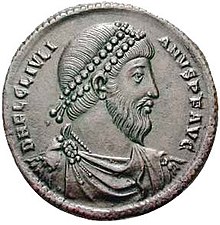Julian I
| Julian | |||||
|---|---|---|---|---|---|
| 63rd Emperor of the Roman Empire | |||||

Portrait of Emperor Julian on a bronze coin from Antioch minted in 360–363
|
|||||
| Reign | Caesar: 6 November 355 – February 360. Augustus: February 360 – 3 November 361. Sole Augustus: 3 November 361 – 26 June 363 |
||||
| Predecessor | Constantius II, cousin | ||||
| Successor | Jovian, general present at the time of his death | ||||
| Born | 331 or 332 Constantinople |
||||
| Died | 26 June 363 (aged 31 or 32) Maranga, Mesopotamia |
||||
| Burial | Tarsus | ||||
| Wife | |||||
| Issue | None known | ||||
|
|||||
| Dynasty | Constantinian dynasty | ||||
| Father | Julius Constantius | ||||
| Mother | Basilina | ||||
| Full name | |
|---|---|
| Flavius Claudius Julianus (from birth to accession); Flavius Claudius Julianus Caesar (as Caesar); Flavius Claudius Julianus Augustus (as Augustus) |
Julian (Latin: Flavius Claudius Iulianus Augustus, Greek: Φλάβιος Κλαύδιος Ἰουλιανὸς Αὔγουστος; 331/332 – 26 June 363), also known as Julian the Apostate, was Roman Emperor from 361 to 363, as well as a notable philosopher and author in Greek.
A member of the Constantinian dynasty, Julian became Caesar over the western provinces by order of Constantius II in 355 and in this role campaigned successfully against the Alamanni and Franks. Most notable was his crushing victory over the Alamanni in 357 at the Battle of Argentoratum (Strasbourg), leading his 13,000 men against a Germanic army three times larger. In 360 in Lutetia (Paris) he was proclaimed Augustus by his soldiers, sparking a civil war between Julian and Constantius. Before the two could face each other in battle, however, Constantius died, after naming Julian as his rightful successor. In 363, Julian embarked on an ambitious campaign against the Sassanid Empire. Though initially successful, Julian was mortally wounded in battle and died shortly thereafter.
Julian was a man of unusually complex character: he was "the military commander, the theosophist, the social reformer, and the man of letters". He was the last non-Christian ruler of the Roman Empire, and it was his desire to bring the Empire back to its ancient Roman values in order to, as he saw it, save it from dissolution. He purged the top-heavy state bureaucracy and attempted to revive traditional Roman religious practices at the expense of Christianity. His anti-Christian sentiment and promotion of Neoplatonic paganism caused him to be remembered as Julian the Apostate by the church. Ironically, he was the last emperor of the Constantinian dynasty, which was the empire's first Christian dynasty.
...
Wikipedia
